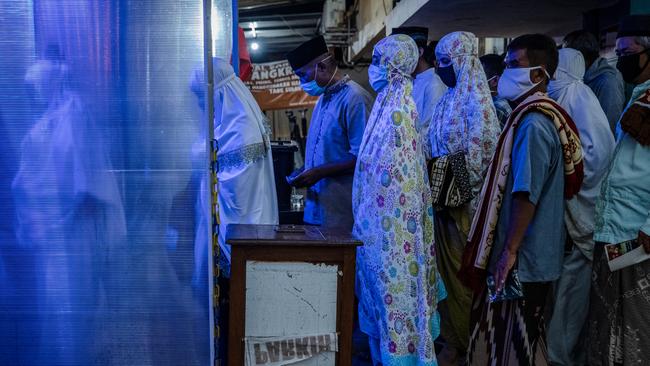Coronavirus: Indonesia’s Jokowi slams door on 32 million
Indonesian authorities have sealed off Greater Jakarta and its 32 million residents.

Indonesian authorities have sealed off Greater Jakarta and its 32 million residents, suspending domestic flights, trains, ferries and all other passenger travel in and out of the region until June to prevent a mass exodus for Ramadan and next month’s Eid holiday that experts have warned would lead to an explosion of COVID-19 cases.
“The ban will apply to all types of public and private transportation by air, sea, land and railway, except for vehicles carrying leaders of state institutions, police and military vehicles, ambulances, fire trucks, hearses and vehicles transporting logistical supplies, staple goods and medicines,” the transport ministry said late on Thursday, just hours before it came into effect.
The new regulations, which effectively close the Indonesian capital and its satellite cities to all in and outbound passengers, also applies to other designated COVID-19 red zones and areas under partial lockdown, including the second city of Surabaya. They do not apply to Bali.
While the government had initially suspended all flights until June 1, it later amended the regulations to exclude the few international flights still operating out of the country. The two remaining Garuda flights per week from Jakarta to Australia will continue to operate for now.
But all train services will be suspended until June 15 and passenger ferries until June 8, with authorities warning the lockdown could be extended. Any violators in private vehicles will be ordered back to their departure point and fined.
The measures came into effect on Friday notwithstanding President Joko Widodo’s claims during a television interview this week that there was insufficient evidence that lockdowns in other countries had led directly to lower rates of infection.
“Show me countries that have imposed a lockdown and managed to resolve this problem. I don’t think there’s (any),” the President, known as Jokowi, told an evening talk-show host, adding it would cost the government about $165m a day to maintain the livelihoods of Greater Jakarta citizens during a lockdown.
His administration has been heavily criticised for its sluggish response to the pandemic, its scant testing and reluctance to enforce lockdowns to curb the spread of the virus.
Until this week, Jokowi had insisted he would allow the traditional Eid mass exodus, known as mudik, to go ahead in order to protect the economy and the millions of informal workers seeking to return to their villages as work dried up in the cities. It was left to the powerful Indonesian Ulema Council to declare the exodus haram during the pandemic.
The government finally announced a mudik ban on Tuesday after repeated warnings from public health experts and modelling suggesting 120,000 people could die by the end of May if a nationwide lockdown was not imposed.
But financial analysts are now warning Indonesia’s “slow, unclear and fractured” response is likely to prolong the outbreak and hinder its economic recovery.
“Given the late containment efforts in Indonesia, we believe that the COVID-19 outbreak will likely last longer compared to other countries in the region,” Fitch Solutions said in a report. “As such, containment measures and border closures will also remain in place for longer.”
Indonesia has one of the highest COVID-19 mortality rates in the world with 647 fatalities from 7775 cases. It also has one of the region’s weakest health systems with only 8158 ventilators for 267 million people. On Thursday, the country’s two largest Muslim organisations, Muhammadiyah and Nahdlatul Ulama (NU), issued fatwas against holding mass prayers or large gatherings for evening meals during the fasting month of Ramadan, which began on Friday.
But in Aceh, the only province where sharia law is applied, the provincial Ulema Council has defied those edicts and said people may perform daily mass prayers and the special Ramadan tarawih (night prayer) despite the outbreak. As a result, thousands flocked to mosques across the province on Thursday night, standing shoulder to shoulder for the first tarawih marking the beginning of Ramadan.
The Indonesian Doctors Association has warned that the move is likely to trigger a wave of local transmissions in the impoverished region.
Aceh authorities are also continuing to cane violators of its strict Islamic code, with four men lashed on Tuesday for drinking alcohol and an unmarried couple punished for sharing a hotel room.
Additional reporting Chandni Vasandani




To join the conversation, please log in. Don't have an account? Register
Join the conversation, you are commenting as Logout